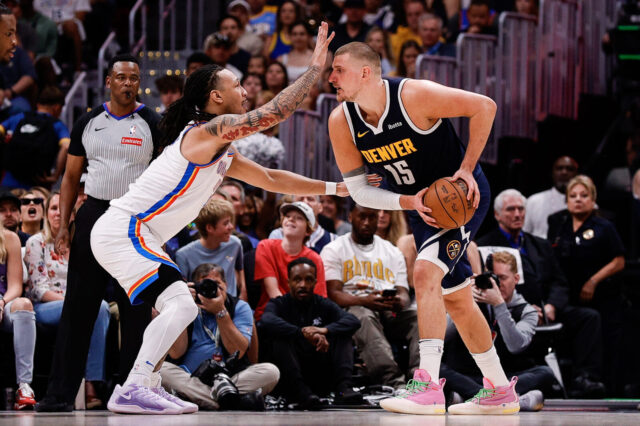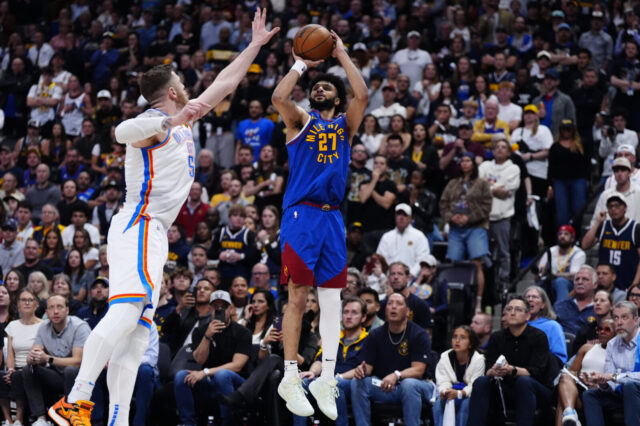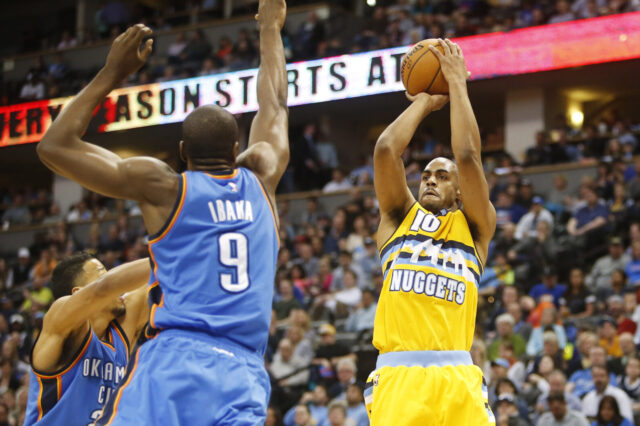 I’ve had the pleasure of meeting Mark Warkentien and Rex Chapman on a number of occasions. Both are good guys. Both deserved to be treated better on their way out of Denver.
I’ve had the pleasure of meeting Mark Warkentien and Rex Chapman on a number of occasions. Both are good guys. Both deserved to be treated better on their way out of Denver.
One was gregarious, gracious and out-going, quick with a smile, a handshake and a pat on the back, and always up for small talk before tip-offs and during post-games.
The other hid in his office during games and could be argumentative and condescending with outsiders and the media, a personality likely honed from years and years of working tirelessly for spoiled athletes and eccentric owners, but never getting the credit he deserved.
Both were good executives. Both were loyal stewards for the Nuggets organization.
Both are good men.
Neither deserved to be treated this way.
Late Tuesday was a sad afternoon at Nuggets headquarters when Kroenke Sports Enterprises president Paul Andrews announced that the contracts of the Nuggets two general managers, vice president of basketball operations Mark Warkentien and vice president of player personnel Rex Chapman, would not be renewed.
In other words, Wark and Rex (as I liked to call them) were fired.
When Warkentien arrived in September 2005 followed by Chapman in 2006 to take over basketball operations from general manager Kiki Vandeweghe (who was let go in May 2006) and assistant GMs Jeff Weltman and David Fredman (let go soon before Chapman’s hiring), they inherited a competitive, up-and-coming team whose future had been mortgaged by the disastrous trade-and-sign for Kenyon Martin in 2004.
So onerous was K-Mart’s deal (and the three first round draft picks that disappeared with it) that Warkentien and Chapman had very little margin for error. But despite the financial stranglehold placed upon them, Warkentien and Chapman – along with team adviser Bret Bearup – added the pieces that made the Nuggets an NBA Finals contender for the first time in 25 years. Such success earned Warkentien the NBA’s Executive of the Year Award in 2009 and Chapman received a vote for the award, as well.
This isn’t to say they always did a great job. After the 2007-08 season concluded, I – and many others – questioned the culture that Nuggets basketball was devolving into under the Bearup, Warkentien and Chapman regime. They may have assembled the most talented team in basketball on paper, but the team’s “rap sheet” far exceeded their playoff win total as management seemed too concerned with talent over character. Despite having owner Stan Kroenke’s $83 million to play with, the Nuggets were becoming dangerously close to morphing into the Jailblazers 2.0 – a team that, coincidentally, was co-architected by Warkentien in Portland just a few seasons earlier. Lest we forget that Warkentien was ready to bring Jamaal Tinsley and Zach Randolph ino the Mile High City, as well.
Presumably (and understandably) furious with an $83 million payroll equaling zero playoff series victories, a number of run-ins with the law among the players and an ever more embarrassing 2008 playoff sweep as an unacceptably low eighth-seed, Kroenke ordered fiscal prudence combined with keeping the Nuggets competitive prior to the beginning of the 2008-09 campaign. And it was under that directive from ownership Bearup, Warkentien and Chapman thrived.
Out was the talented but oft-injured Marcus Camby and in was salary cap flexibility. Out was the talented but expensive, high maintenance and quickly aging Allen Iverson and in was the classy, professional, former NBA Finals MVP (and local hero) Chauncey Billups. Out were useless characters like DerMarr Johnson, Ruben Patterson, Chucky Atkins and Reggie Evans. In were high-character guys like Dahntay Jones, Chris Andersen, Ty Lawson and Arron Afflalo.
The results on the floor spoke for themselves. Under the Bearup, Warkentien and Chapman administration, the Nuggets – for the first time in franchise history – won 50 regular season games three consecutive times, appeared in their second Western Conference Finals and had the Nuggets “in the conversation” of elite NBA teams. Just recently, SB Nation’s NBA guru Mike Prada ranked Warkentien fifth among all 30 NBA general managers.
And for all that, Warkentien and Chapman are jobless, leaving Bearup, Stan and Josh Kroenke searching for a new general manager.
While I sincerely appreciate what the Kroenkes have done for professional basketball in Denver (need I bring up the previous ownership group as a reminder of what a disaster things were around here before Stan bought the team), I’m seeing a pattern emerge in how they handle their business with top executives that I’m not enamored with. Like Kiki Vandeweghe, Jeff Weltman and David Fredman before them, Warkentien and Chapman were left to twist in the wind as Kroenke and Andrews teased them with the possibility of a contract extension while other NBA teams filled their vacant management positions. The organization pulled the same stunt in the handling of George Karl’s expiring contract, which makes you wonder if Karl would even have been re-signed at all had he not gotten sick.
All this begs the obvious question: if the Kroenkes were resolute on not bringing back Warkentien or Chapman, why wait this long to formally announce the decision?
One theory is to follow the money. With Warkentien and Chapman under contract until August’s end, perhaps Kroenke figured he’d use their services through the draft and free agency – i.e. get his money’s worth – and then bring in someone new come September 1st so he didn’t have to pay out more in GM salary than he already had to.
Another theory is that Warkentien and Chapman had the summer of 2010 to prove themselves worthy of an extension and didn’t come through. While everyone in Denver is enthused by the signing of Al Harrington, no one will mistake his arrival as something that gets the Nuggets back to the conference finals. And the Nuggets inability to get into the 2010 NBA Draft – first or second round – or deal for a legitimate big man may have sealed Warkentien and Chapman’s collective fate.
A few months ago, I was pinned down by 104.3 The Fan’s Sandy Clough to pick one or the other – Warkentien or Chapman – and I sided with Warkentien while noting that I liked the balance the two brought to the organization. I’ve always felt that Warkentien knew how to get deals done and found deals that most of his peers couldn’t – an essential talent in a small market like Denver. Warkentien’s acquisitions of J.R. Smith and Arron Afflalo are just two examples of his work at its best. My instincts have since proven to be right as Andrews acknowledged to Fanhouse’s Chris Tomasson that Chapman never had negotiating authority and head coach George Karl’s comments in the wake of the firings were only about Warkentien while making no mention of Chapman whatsoever.
To be clear, I don’t have an issue with the Nuggets moving in a new direction with management. Maybe Warkentien and Chapman finally wore out their welcome and it was time to move on. I just wish that the Kroenkes and Andrews would be more upfront with those who serve their organization loyally, especially if it enables ex-employees to find employment elsewhere before it’s too late. And while the Nuggets gave Warkentien permission to interview with other teams, I wouldn’t be surprised if the carrot of returning to Denver encumbered him and his agent’s ability to negotiate elsewhere.
Moving forward, if I were Stan and Josh Kroenke I’d have already signed former Trail Blazers GM Kevin Pritchard to become the Nuggets next GM. Other than missing on Kevin Durant to draft Greg Oden (something Blazers owner Paul Allen allegedly insisted on anyway), Pritchard did a masterful job rebuilding a Portland team torn asunder by many of the moves Warkentien and former GM Bob Whitsitt made years ago. I’ve heard Pritchard may have too big a personality to fit in with the under-the-radar Kroenkes and the behind-the-scenes Bearup, but he’s a talented executive in addition to being a former player. I believe Pritchard would be a great fit here.
The other names being bandied about are intriguing. Tommy Sheppard – the former director of player relations and team services for the Nuggets now working for the Wizards – is a super nice and classy guy with Denver roots, but I think it’s fair to question whether or not we should hire a former media relations man to run the basketball personnel side of things (just look how well it’s working out in Minnesota with David Kahn).
I’m not as familiar with the other names that surfaced on Tuesday – either David Griffin (formerly of the Suns) or Masai Ujiri (a former Nuggets scout currently with the Raptors). Doing some digging on Griffin, he worked with Steve Kerr to bring in the likes of Jared Dudley, Robin Lopez, Goran Dragic and Channing Frye to Phoenix. A guy with that pedigree could be a great fit in Denver where finding diamonds-in-the-rough is necessary for future success. Ujiri, a Nigerian-born basketball executive with an international scouting background, would bring an international element that a small market team like the Nuggets could really use.
I’ll wrap up my thoughts on the Nuggets GM situation with a quick story about my first run-in with Mark Warkentien. Prior to the tipoff at Pepsi Center of the Nuggets/Lakers Western Conference Finals Game 3 in 2009, I found myself chatting with a few Nuggets executives including their head of statistical analysis, Dean Oliver, near courtside. Just a few seats away was Warkentien, whom I had just met and congratulated on winning the NBA’s Executive of the Year Award. Out of nowhere, Warkentien interrupts our conversation by saying: “Andrew, you’re a smart guy and a great writer, but your entire argument for firing George Karl [referring to the four months of 2008 when firegeorgekarl.com existed] was total horseshit. You have no idea how hard it is to win 50 games in this league. And you have no idea how tough that locker room was.” (Nevermind that Warkentien forgot to acknowledge who assembled many of the characters in that locker room in the first place.)
With Warkentien being an adamant Karl supporter, I didn’t blame him for standing up for his good friend but still felt the need to defend myself, especially since I had changed the site’s mantra more than a year earlier and had been bullish on Karl from the start of the 2008-09 season. I countered with something along the lines of: “I’ve been very bullish on George all year. But that doesn’t change the fact that 50 wins isn’t an accomplishment when a team is expected to compete for a championship. Last I checked, barely making the playoffs and getting swept in the first round isn’t an accomplishment.”
“Who expected them to compete for a championship? Who?” Warkentien asked.
“How about the fans, the experts, Carmelo Anthony [who had predicted a 60-win season during training camp], Stan’s $83 million payroll?” I replied. “You don’t know what you’re talking about,” Wark went on, “who are these experts? They don’t know how hard it is to win 50 games. And you just have no idea what that locker room was like.” (Again, disregarding that he was responsible for assembling those players together).
Then, in his condescending and snarky manner that fans became accustomed to in his always interesting radio interviews, Warkentien directed the conversation back at me: “Let me ask you something: how many games were the Nuggets favored to beat the Lakers last year? How many?” I tried to reply: “None, but…” Warkentien cut me off: “Exactly. None!” “But that’s not the point,” I countered. “My point is that that team shouldn’t have been an eighth seed in the first place.” Both knowing the argument was going nowhere, we kind of shrugged our shoulders, continued watching pre-game warm-ups and implicitly agreed to disagree.
Never wanting to leave things on bad footing, I then said: “You have to give me a little credit. After I realized what was going on [here in Denver], I changed the name of the site to Denver Stiffs and have been very supportive of George all season. I even advocated for him to get Coach of the Year consideration.”
“That award means nothing,” Warkentien retorted. He then turned to Dean Oliver. “Hey Dean, tell young Andrew here how many Coach of the Year winners stay with their teams after winning the award?” Oliver would go on to explain that every Coach of the Year Award winner – with very few exceptions – dating back 20-something years had either quit or been fired from their teams within two or three years of winning the award. “See,” said Warkentien. “It means nothing!”
I then asked Oliver: “Hey Dean, how many Executive of the Year Award winners stay with their teams soon after winning the award?” Warkentien, the current award recipient, got a good chuckle out of that line and I figured I’d leave on that note. Now I feel kind of bad for saying it.
Before heading back to my seat, I shook Warkentien’s hand, he winked (but didn’t smile) at me and said: “Keep up the good work.”
Both will be missed and I wish them and their families the very best.
Photo courtesy of AP: Jack Dempsey


